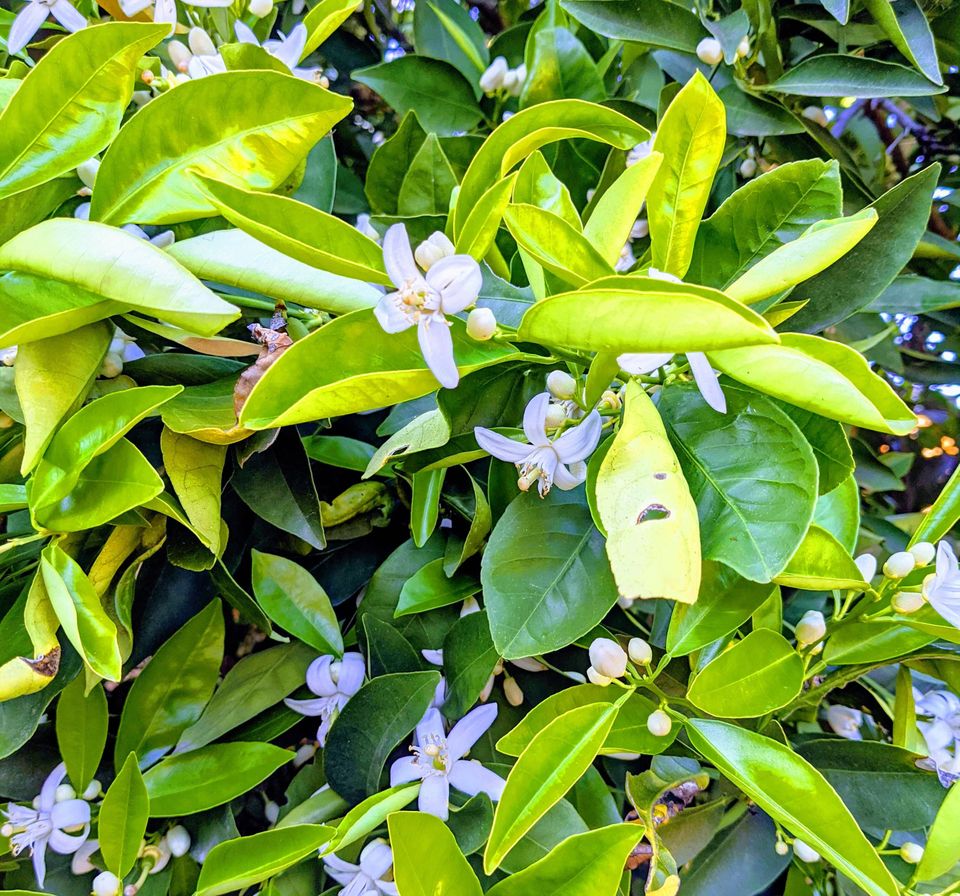It Isn't Enough

The orange trees are blossoming in my backyard. I wouldn't have noticed – I've been too focused on my job this week, and I've been doing perfunctory work in the garden at best, paying attention to what's needed rather than what's beautiful. But the fragrance of orange blossoms is heavy in the air today, impossible to ignore. I'm not the only one who noticed: this morning, a fat bee, off-balance with the weight of collected pollen, nearly collided with me on his way to work.
One bee, heading valiantly toward those trees, which have erupted with easily a thousand blossoms. My first thought was that he must be completely overwhelmed. Faced with the task of harvesting from all those flowers, of supporting an entire hive, of enriching an entire ecosystem – that bee must be feeling an immense sense of pressure. How could his work ever be enough? How can his little legs possibly bring back a sufficient amount of pollen, how he produce enough honey, how, how, how?
It's all too much, it's all too difficult, and maybe it would be easier just to look away from all that work and go think about something else.
But of course, that's ridiculous of me. Not because bees don't get overwhelmed (research indicates that they do) but because bees don't get overwhelmed by the same things I do. That fat bee doesn't share my false sense of individualism. The bee does not think, as I often do, that it is his duty to feed the entire hive alone. He is never alone. He is part of a collective – just one of the hundred bees that were on that tree today – and his work is part of a massive shared effort. He does what he can, and it is never going to be enough. But it is also always enough.
When I think of myself as an individual, I get overwhelmed. I consider all the work that needs to be done to support the ecosystem that is a just society – all the money that needs to move, all the wrongs that must be righted, all the people who need and deserve justice and care – and I find myself paralyzed by the weight of it all. It feels impossible. It feels like it'd be better to do nothing than to risk doing the wrong thing. It feels like I, as an individual, can never do all that's needed; I can never do enough.
And that's true. I can't. Not on my own.
I feel lost and alone when I try, all on my own, to shoulder the workload that belongs to all of us, together. That's because the workload doesn't belong to me. I'm part of a collective. We all are. Activists, organizers, nonprofits, legislators, lobbyists, communities, families – we are all together, working to make the world we live in better than it was when we arrived in it. We love each other, and fight for each other, and care for each other, and it is never going to be enough. But it is always enough.
We don't have to be afraid that the job at hand is too large. We can, instead, find joy and comfort in knowing that the work we each do, no matter how small we might feel, is part of something larger than we can ever comprehend. Whether or not it's enough – whether or not we as individuals ever feel satisfied that our work is sufficient – we do what we can. Each of us individually, and all of us together. There is no other way.
Here are some things that you can do to support Asian American and Pacific Islander communities – to support individuals and communities, especially those who have been impacted by the increase in targeted violence in the United States over the course of the past year and those who have been directly impacted by recent events. It won't feel like you're doing enough, and that's okay: you're not working alone. Do what you can.
If you or someone you know has been a victim of targeted violence against AAPI individuals and communities, report it at Stop AAPI Hate. You can fund their work battling hate crimes against AAPI people by donating here.
Find out how to support your local AAPI community. This google doc, compiled by these two individuals, features links to local resources organized by state. If you live in the United States, you can use it to find ways to get involved and active on a local level.
Attend bystander intervention training. The idea of witnessing a hate crime in progress and intervening to prevent it from escalating is scary to many people; fortunately, you don't have to go in unprepared. Learn from the experts so you can do what's right if the time comes.
Educate yourself about America's history of scapegoating AAPI citizens. American public school education rarely covers this facet of American history; educate yourself so you know the roots of this weeks violence.
Donate money to AAPI communities. That link includes a round-up of 61 different places to which you can direct funding.
This is just a start. This carrd compiles many, many more resources to which you can refer as you figure out what you're capable of, where you're needed, and how you're going to do the work.
Together, as we do what we can, we can make things better. In the meantime, care for yourself and the people around you. Believe that the world can be better than it is now. Never give up.
-Gailey
If you haven’t already, I hope you’ll consider subscribing to this newsletter. The subscriber community is a wonderful and supportive one, and we’re spending 2021 finding new ways to stay connected and share experiences.

Member discussion